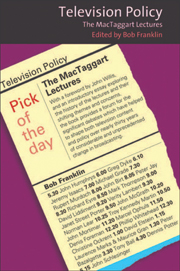Book contents
- Frontmatter
- Contents
- Acknowledgements
- Foreword
- Introduction
- The James MacTaggart Lectures
- TV Drama: The Case against Naturalism
- Naturalism and Television
- Taboos in Television
- Signposting Television in the 1980s: The Fourth Television Channel
- Television Drama, Censorship and the Truth
- The Day after Tomorrow: The Future of Electronic Publishing
- The Primacy of Programmes in the Future of Broadcasting
- Reflections on Working in Film and Television
- ‘Opening up the Fourth Front’: Micro Drama and the Rejection of Naturalism
- Power and Pluralism in Broadcasting
- Ethics, Broadcasting and Change: The French Experience
- Freedom in Broadcasting
- Deregulation and Quality Television
- The Future of Television: Market Forces and Social Values
- The Future of the BBC
- Occupying Powers
- A Culture of Dependency: Power, Politics and Broadcasters
- Talent versus Television
- A Glorious Future: Quality Broadcasting in the Digital Age
- Rewarding Creative Talent: The Struggle of the Independents
- Television versus the People
- Public-Interest Broadcasting: A New Approach
- A Time for Change
- The Soul of British Television
- Television's Creative Deficit
- Freedom of Choice: Public-Service Broadcasting and the BBC
- First Do No Harm
- Appendix A Edinburgh International Television Festival, 29 August–2 September 1977: Programme
- Appendix B Précis of Ted Turner, James MacTaggart Lecture 1982; Dr Jonathan Miller, James MacTaggart Lecture 1983
- Index
Public-Interest Broadcasting: A New Approach
from The James MacTaggart Lectures
Published online by Cambridge University Press: 05 August 2013
- Frontmatter
- Contents
- Acknowledgements
- Foreword
- Introduction
- The James MacTaggart Lectures
- TV Drama: The Case against Naturalism
- Naturalism and Television
- Taboos in Television
- Signposting Television in the 1980s: The Fourth Television Channel
- Television Drama, Censorship and the Truth
- The Day after Tomorrow: The Future of Electronic Publishing
- The Primacy of Programmes in the Future of Broadcasting
- Reflections on Working in Film and Television
- ‘Opening up the Fourth Front’: Micro Drama and the Rejection of Naturalism
- Power and Pluralism in Broadcasting
- Ethics, Broadcasting and Change: The French Experience
- Freedom in Broadcasting
- Deregulation and Quality Television
- The Future of Television: Market Forces and Social Values
- The Future of the BBC
- Occupying Powers
- A Culture of Dependency: Power, Politics and Broadcasters
- Talent versus Television
- A Glorious Future: Quality Broadcasting in the Digital Age
- Rewarding Creative Talent: The Struggle of the Independents
- Television versus the People
- Public-Interest Broadcasting: A New Approach
- A Time for Change
- The Soul of British Television
- Television's Creative Deficit
- Freedom of Choice: Public-Service Broadcasting and the BBC
- First Do No Harm
- Appendix A Edinburgh International Television Festival, 29 August–2 September 1977: Programme
- Appendix B Précis of Ted Turner, James MacTaggart Lecture 1982; Dr Jonathan Miller, James MacTaggart Lecture 1983
- Index
Summary
Richard Eyre's 1999 MacTaggart Lecture announced the imminent demise of public-service television: ‘It's a gonner’ – and for three reasons. First, public-service broadcasting relies on regulators who are increasingly overwhelmed by the expansive sources of broadcast information: this will result in inequities. Second, it relies on an active broadcaster and a passive viewer, but ‘at the end of a tiring day viewers don't always choose what's good for them’. Third, public-service broadcasting lacks any agreed definition. Modifying Oscar Wilde's judgement of fox hunting, Eyre declares public-service broadcasting to be ‘The unsustainable in pursuit of the undefinable.’ Public-service broadcasting must give way to public-interest broadcasting, which will provide salvation for the BBC because it will oblige the Corporation to engage with viewers ‘more wholeheartedly’. The key difference is that while ‘service is what you do for people … interest is what they give you and what you elicit from them’. It implies a contract and consensus between broadcasters and audience.
This shift does not imply the end of quality television. Broadcasters cannot merely pursue the lowest common denominators, because it is not in their interest to do so. ITV must be a public-interest broadcaster if it is ‘to draw large audiences. So must the BBC, S4C and Channel 4. And Channel 5.’ The difference between public-interest broadcasting at the BBC and ITV is that the former must try to achieve maximum weekly reach while commercial common sense will sustain an ITV that is unequivocally in the public interest by generating diverse and high-quality programming: to do otherwise risks forfeiting market position.
- Type
- Chapter
- Information
- Television PolicyThe MacTaggart Lectures, pp. 219 - 228Publisher: Edinburgh University PressPrint publication year: 2005



